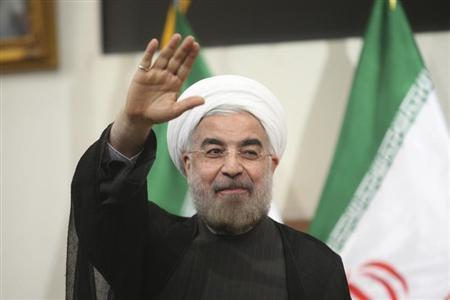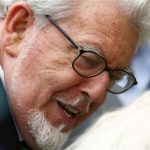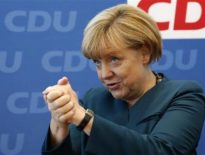(Reuters) – President Hassan Rouhani said on Monday he would use his visit to the United Nations this week to present the “true face of Iran” and to pursue talks and cooperation with the West to end Iran’s nuclear dispute.

A moderate conservative elected in June, Rouhani was speaking shortly before a five-day trip Western powers hope will show a new readiness on Tehran’s part to strike a deal on a nuclear program they fear could yield an atomic bomb.
Iran has repeatedly stated its nuclear activities are peaceful, a message it sought to emphasize on Monday with the phased transfer to Iranian engineers of its only nuclear power plant from its Russian contractors.
“Unfortunately in recent years the face of Iran, a great and civilized nation, has been presented in another way,” Rouhani said, according to comments published on his official website. “I and my colleagues will take the opportunity to present the true face of Iran as a cultured and peace-loving country,”
Rouhani did not make clear who he blames for any distortion of Iran’s image. But the comments suggest he is intent on distancing himself from the controversial, outspoken approach to the West adopted by predecessor Mahmoud Ahmadinejad.
The United States and its allies have imposed increasing economic sanctions on Iran in recent years, partly a response to what the West regards as Tehran’s failure to open its nuclear program to international inspection. Ahmadinejad had also raised concern with comments on the Holocaust and homosexuality.
Israel has made it clear it could mount a strike against Iran if it felt Tehran were close to acquiring nuclear weapons.
Rouhani, a former nuclear negotiator under reformist president Mohammad Khatami, criticized the West over sanctions he said had inflicted suffering on Iranians.
“On this trip, I will try to deliver the voice of the oppressed people of Iran to the world and we should say that sanctions are an illegal and unacceptable path,” he told journalists before leaving, his official website reported.
“The West should opt for the path of talks and cooperation and consider mutual interests,” he said.
SANCTIONS BITING
Rouhani has vowed to improve Iran’s ailing economy, which has suffered deeply from embargoes.
Last week Rouhani’s tone was endorsed by Iran’s most powerful figure, Ayatollah Ali Khamenei, who spoke of “heroic flexibility”, suggesting a new willingness to engage in diplomacy with Iran’s adversaries.
U.S. officials have left open the possibility that U.S. President Barack Obama and Rouhani could meet on the sidelines of the U.N. meeting.
Iran’s foreign minister and lead nuclear negotiator, Mohammad Javad Zarif, was set to meet the European Union foreign policy chief, Catherine Ashton, formally starting the new era of negotiations between the two sides.
An unnamed source close to Iran’s negotiators was quoted by the state news agency, IRNA, as saying talks between the two parties had been “completely transformed” by Rouhani’s election.
“This is a new game and it will have new rules and the aim is to reach common points of agreement between both sides,” the source was quoted as saying.
Rouhani described the transfer of the Bushehr nuclear power plant from its Russian engineers as a “blessed event”
Iran’s nuclear energy chief, Ali Akbar Salehi, said Tehran was in talks with Moscow about the construction of more such plants.
Russian experts would remain at the plant under an agreement between the two sides before it is transferred completely to Iran, ISNA news agency quoted him as saying, describing it as an “interim” phase that could last two years.
Bushehr is not considered a major proliferation risk by Western states, whose fears are focused on sites where Iran has defied global pressure by enriching uranium beyond levels needed to fuel power plants.
(Reporting by Marcus George, Editing by William Maclean and Ralph Boulton)





